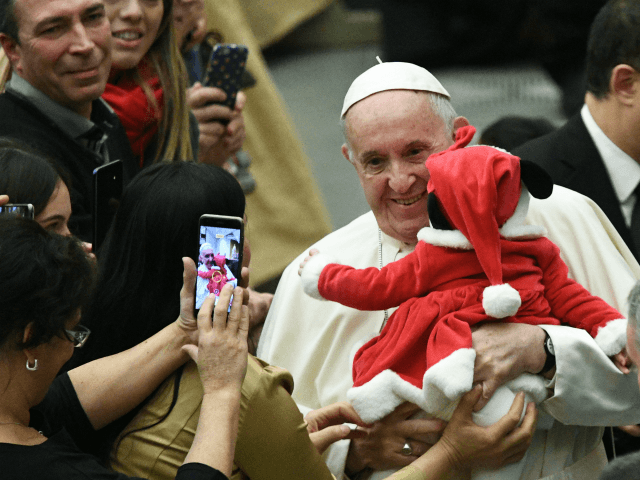In his yearly Christmas message, Pope Francis urged the world to celebrate differences among people as a source of enrichment rather than a liability.
“Our differences,” the pope told the 50,000 people gathered in Saint Peter’s Square for his Urbi et Orbi blessing, “are not a detriment or a danger; they are a source of richness. As when an artist is about to make a mosaic: it is better to have tiles of many colours available, rather than just a few!”
“The experience of families teaches us this,” he said, “as brothers and sisters, we are all different from each other. We do not always agree, but there is an unbreakable bond uniting us, and the love of our parents helps us to love one another.”
“The same is true for the larger human family, but here, God is our ‘parent,’ the foundation and strength of our fraternity,” Francis said.
In his message, the pope said that the universal message of Christmas is “that God is a good Father and we are all brothers and sisters.”
“This truth is the basis of the Christian vision of humanity,” he said. “Without the fraternity that Jesus Christ has bestowed on us, our efforts for a more just world fall short, and even our best plans and projects risk being soulless and empty.”
The pope said that a spirit of universal brotherhood or “fraternity” is his wish for the world this Christmas, and then went on to suggest enumerate areas where this fraternity is especially needed:
– Fraternity among individuals of every nation and culture.
– Fraternity among people with different ideas.
– Fraternity among persons of different religions.
By becoming man, “the Son of God tells us that salvation comes through love, acceptance, respect for this poor humanity of ours, which we all share in a great variety of races, languages, and cultures,” he said.
Francis also mentioned a number of geographical trouble spots that need to rediscover fraternity so that differences between peoples do not lead to divisions and conflict.
“May it enable Israelis and Palestinians to resume dialogue and undertake a journey of peace that can put an end to a conflict that for over seventy years has rent the land chosen by the Lord to show his face of love,” he said.
Staying in the Middle East, the pope prayed for the “beloved and beleaguered” country of Syria, as well as Yemen, “exhausted by war and famine.”
The pope prayed for Africa, “where millions of persons are refugees or displaced and in need of humanitarian assistance and food security,” asking the Christ child to “silence the clash of arms and allow a new dawn of fraternity to rise over the entire continent.”
Turning to Asia, Francis prayed for the unity of the Korean peninsula, wishing that Christmas might “consolidate the bonds of fraternity” and “help the path of rapprochement recently undertaken to continue.”
In South America, the pope prayed that Venezuela might “recover social harmony and enable all the members of society to work fraternally for the country’s development,” while expressing his desire that the people of Nicaragua might “see themselves once more as brothers and sisters.”
Among European nations, the pope singled out “the beloved land of Ukraine,” that it might “recover from the sufferings it has endured and restore dignified living conditions for its citizens.”
As he has done on other occasions, the pope also prayed for persecuted Christians who celebrate Christmas in an environment of adversity.
“A particular thought goes to our brothers and sisters who celebrate the Birth of the Lord in difficult, if not hostile situations,” he said, “especially where the Christian community is a minority, often vulnerable or not taken into account.”
“May all of us receive peace and consolation from the birth of the Savior and, in the knowledge that we are loved by the one heavenly Father, realize anew that we are brothers and sisters and come to live as such!” he concluded.
Follow Thomas D. Williams on Twitter Follow @tdwilliamsrome

COMMENTS
Please let us know if you're having issues with commenting.